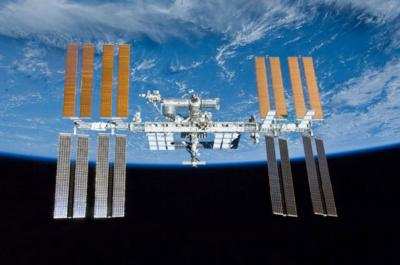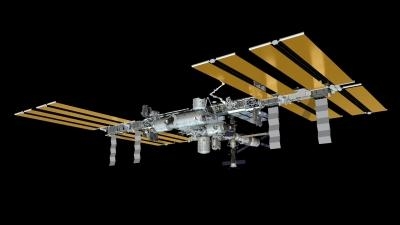Obama Administration 'Hopeful' That International Community Will Follow Suit
As more than 30 heads of space agencies from around the world prepare to gather in Washington January 9-10 for an unprecedented summit on the future of space exploration, the White House issued a news release saying that the Obama Administration has approved an extension of the International Space Station (ISS) until at least 2024. "We are hopeful and optimistic that our ISS partners will join this extension effort and thus enable continuation of the groundbreaking research being conducted in this unique orbiting laboratory for at least another decade," the release stated.

The White House said the extension of ISS operation will allow NASA and the international space community to accomplish a number of important goals.
It will allow NASA to complete necessary research activities aboard the ISS in support of planned long-duration human missions beyond low-Earth orbit—including our planned human mission to an asteroid by 2025 and to Mars in the 2030s. NASA has determined that research on ISS is necessary to mitigate fully 21 of the 32 human-health risks anticipated on long-duration missions. A related critical function of ISS is testing the technologies and spacecraft systems necessary for humans to safely and productively operate in deep space. Extending ISS until 2024 will give us the necessary time to bring these systems to maturity.
ISS extension will extend the broader flow of societal benefits from research on the Station. Research conducted on the ISS has already resulted in a number of discoveries with significant medical and industrial implications. Medical examples include potential vaccines for Salmonella and antibiotic-resistant strains of bacteria, and a microencapsulation technique for delivering cancer treatment drugs to tumors without affecting healthy cells. Additionally, technologies advanced by the ISS have led to robotic surgical techniques that are opening the door to successful removal of tumors that were previously considered inoperable.

A further benefit of ISS extension is it will give NASA and its private-sector partners time to more fully transition to the commercial space industry the transportation of cargo and crew to low-Earth-orbit, allowing NASA to continue to increase its focus on developing the next-generation heavy-lift rocket and crew capsule necessary for deep-space exploration, according to the release.
Two American companies are already under contract to resupply the ISS. The current cargo contracts will end in the 2016/2017 timeframe, but the extension of ISS to at least 2024 will allow many more flights to be added to the ISS cargo services contract, resulting in more competitive pricing, possible additional new private-sector bidders, and ultimately more U.S. commercial satellite launches. With the first commercial crew flight scheduled for 2017, some had questioned the value of a commercial crew investment that would have lasted only three years. Extending ISS to 2024, with a concomitant increased number of flights, will drive down the per-flight cost and make this investment even more attractive.
The ISS is also playing an increasingly important role in the study of the Earth and its changing climate. In the next few years, the ISS will host several Earth- and space-science instruments, including the Stratospheric Aerosols and Gases Experiment (SAGE III), the RapidSCAT ocean winds measurement instrument, the Orbital Carbon Observatory (OCO-3), the Cosmic Ray Energetics and Mass (CREAM) experiment, the Calorimetric Electron Telescope, and others. Ensuring the stability and availability of the ISS through 2024 will instill confidence in the science community that the ISS platform will be available for important, long-term research endeavors.

Finally, extending the ISS will help cement continuing U.S. leadership in human spaceflight going forward. The ISS is the most complex and challenging engineering endeavor in history. The key to its success has been the combination of NASA ingenuity and international cooperation. With a partnership that includes 15 nations and with 68 nations currently using the ISS in one way or another, this unique orbiting laboratory is a clear demonstration of the benefits to humankind that can be achieved through peaceful global cooperation. It is important to keep this partnership intact, with America as its leader. Leadership in space brings with it economic growth, technological prowess, and national pride, and contributes to American global leadership more broadly.
The ISS is a unique facility that offers enormous scientific and societal benefits. The Obama Administration’s decision to extend its life until at least 2024 will allow us to maximize its potential, deliver critical benefits to our Nation and the world, and maintain American leadership in space.
(Images from file)
 ANN's Daily Aero-Linx (04.16.24)
ANN's Daily Aero-Linx (04.16.24) Aero-News: Quote of the Day (04.16.24)
Aero-News: Quote of the Day (04.16.24) Airborne 04.10.24: SnF24!, A50 Heritage Reveal, HeliCycle!, Montaer MC-01
Airborne 04.10.24: SnF24!, A50 Heritage Reveal, HeliCycle!, Montaer MC-01 Airborne 04.12.24: SnF24!, G100UL Is Here, Holy Micro, Plane Tags
Airborne 04.12.24: SnF24!, G100UL Is Here, Holy Micro, Plane Tags Airborne-Flight Training 04.17.24: Feds Need Controllers, Spirit Delay, Redbird
Airborne-Flight Training 04.17.24: Feds Need Controllers, Spirit Delay, Redbird





